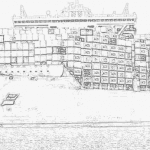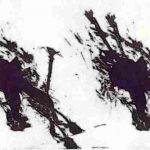Lieutenant Robert Dassin wished he could say “So long firing squad, so long death,” considering his bad luck today. For years he’d been accustomed to getting into trouble for a variety of reasons and always getting away with it, either by fooling his accusers through sheer intelligence or careful planning. This time it was different. Military guards kept him well secured in this dreadful room they’d shoved him in.
Sitting on the floor alone in the dark in a stinking corner against a sticky wall without any kind of ventilation for hours was driving him crazy already. A simple mistake was going to cost him his life. Ridiculous, and yet true. This time nobody could save him.
His mind had been recalling what had led to it, little by little.
El Escorial—this enormous, beautiful, world famous castle, now temporarily converted into a field hospital—has served him well. Him, his ambulances, wounded Republican soldiers, medics, nurses, stretcher bearers, and assistants of the 13th International Brigade stationed there.
Classified as a “shock troop,” this brigade, now half decimated by the outcomes of its fierce, almost suicidal, frontal attacks on enemy positions to save the Republic, remained fully engaged around a critical Guadarrama River bridge that connected Brunete with Boadilla del Monte, which is to say in the middle of it all.
Often, Robert would sleep in El Escorial, which enemy planes respected for its structural and historic greatness, but it was awfully dangerous, mostly at night, to drive on the roads leading to it from Brunete, the battle site, a small village near Madrid surrounded by wheat fields, cork-oak trees, and healthy vegetables.
Hardly anybody valued anymore the critical and noble job of ambulances in the Spanish Civil War. The Geneva Convention had lost the power, it seemed, to hold any soldier (or group of soldiers) responsible for sudden attacks on them—a very common occurrence. On the contrary, any time a Nazi plane spotted an ambulance, it would plunge without hesitation to shoot it down. Fortunately, planes could only shoot with success on the plains, not the mountains.
Nazi planes began their raids at night, with their frightening, ear-splitting e-e-e-e-e-eeeeeeeee noise, bombing city structures, tanks, trucks, ambulances, soldiers, and civilians as the battle raged on day after day. They usually dropped phosphorous bombs at night. These bombs were designed to create great fires, especially on the many wheat fields that filled the landscape. They forced the Republican soldiers to run in panic to other areas, quickly engulfed in huge, abrasive burning clouds of flames and smoke. They quickly scorched everything to the ground—arms, ammunition, armored trucks, infantry equipment, tanks, and ambulances–causing terror and destruction. Hellish explosions of burning metals, a vivid red-orange in color, accompanied by human cries from wounded combatants and civilians.
Often, a Nationalist fascist plane (which could be either Italian, Spanish, or German) would be hit by a Republican anti-fascist plane (which could be either Spanish, French, or Russian), sending the aflame machine spiraling down to earth. If lucky, the fascist pilot would try to jump and parachute to safety. Only to be immediately shot down by a fascist comrade.
Those were their rules! Nobody in the enemy camp would be able to catch him alive and subject him to vicious interrogations. Plus, this way, nobody could accuse him of violating the sensitive Non-Intervention Pact (no foreign military forces were allowed on the battlefields of Spain). Russian violators, on the other hand, didn’t shoot each other this way. They could be nasty too, and often were, but not at this level of inhumanity.
In the Nationalist camp, the powerful Nazis planes (of the notorious Condor Legion so praised by Hitler) were fully in charge of the aviation, while the Italians (Mussolini’s bravest), almost half-a-million of them, spread out in key areas as infantry ground troops, dominated the landscape.
The Nazi planes were a major problem for Robert, who headed the convoys of Republican ambulances, trucks carrying medical supplies, trucks carrying water, doctors, nurses, stretch bearers, and other personnel. Ambulance drivers were special targets because they constantly roamed the front areas of battle fields, near trenches and shooting areas, picking up sick and wounded soldiers, which they had to drive first to field hospitals, and later to larger hospitals in nearby villages away from the fire and carnage. Many drivers couldn’t hide their great fear of being shot, thus losing their ability for remaining cool and efficient under those mind-wrecking conditions. When spotted by a Nazi plane, they often panicked and lost control of their vehicle, usually loaded with wounded soldiers, desperately hitting any salient part of the road, plunging on a dish, or going over a cliff. Only four of Robert’s twenty ambulances and six of his drivers remained.
It had been a difficult day already for Robert. Sitting next to him at the wheel on this particular ambulance was “Le Plouc” (Robert’s way of calling his preferred driver), a Breton native, French driver of great skill and admirable coolness. They were headed for Brunete from El Escorial to pick up three wounded soldiers in the trenches, on the Brunete front, keeping themselves alert and talkative so as not to fall asleep. Above, the scorching sun maintained a castigating effect on the two brigadiers, their thick uniforms adding a few degrees of temperature to their sweating bodies. Now and then Robert would touch his military Star 9mm pistol, tightly secured in its holster. Turn of events in recent confrontations of the war could not guarantee it was still there.
Soon the ambulance would enter the last section of the road, a 10 km stretch past Valdemorrillo drivers called la recta de la muerte, the straight stretch of death, because it could easily be spotted by Nazi planes, ready to swoop down and spray bullets. It was very difficult to avoid being shot, unless the driver was skillful enough to trick them by taking in a hurry one of the curved little roads off the stretch heading toward the forested mountains. At which point, any low-altitude chasing and strafing would be almost out of the question.
Robert very often rode with his drivers at their insistence. They believed he had baraka—special protection from Allah. So did some Algerians he had befriended back in that country six years ago while doing his obligatory military service. Obligatory because military matters had never appealed to him, which he often demonstrated by rebelling against his superiors and ending up in military jail (or worse, solitary confinement). But baraka had proven very useful to him. For instance, he’d driven his ambulances hundreds of times on la recta de la muerte during the past few weeks and not once had he been shelled by fascist planes. In fact, Le Plouc had asked Robert to accompany him on this trip today, fearing he might be hit otherwise. If you had baraka, it was believed those accompanying you were protected as well. And so far, they both remained safe and alive.
From his stuffy, unaired, dark corner, in the daunting little room, Robert remembered more of the events leading to his horrible situation:
“We’re approaching la recta de la muerte…how do you feel, Le Plouc?”
“Nervous…”
“Keep driving but at reduced speed…”
“Why?”
“We have company…” Robert had noticed a fascist plane in the distance. “Don’t freak out now…we’re going to lose him…”
Le Plouc’s fingers began to shake. “I knew it was going to happen. Damn it!”
“Drive steady…turn left on the third chemin de terre…when I tell you…”
“But we’re not even close, Robert. I know this chemin…”
“Trust me.”
The fascist plane, showing a swastika emblem under both wings as it descended and pirouetted dangerously with its creepy sound, whacked the daylights out of Le Plouc’s mind, which he awkwardly tried to control.
“Turn! Now!”
The ambulance turned with a sharp swing before the first round of bullets struck the hot pavement behind, back wheels shrieking, clouds of dark-brown dust coloring the air. Almost losing its balance and toppling over, it regained its equilibrium and jammed forward at full speed toward the tree-covered hills.
“Bravo ! Bravo !”
##
Le Plouc drove on, sheltered by pines and dense foliage. The ambulance followed a series of curves that delineated the road.
“Hey, there’s a little house over there…” said Robert. “Never seen it before.”
Le Plouc slowed down.
“Stop the ambulance. I’m going to walk to the house and check it out.”
About half way on his walk, the front door swung open briskly and a very angry middle-aged man wearing simple clothes walked out to meet him, gesturing grossly with both hands wide open and yelling all kinds of insults and obscenities. He was quickly escorted away by six strong men.
“Fuera de aquí, cobarde!” Get out of here, chicken shit!
Robert couldn’t accept being called a coward by anyone, especially in this demeaning manner. Automatically, he threw a solid, direct punch to his face.
It must have been really hard and precise, for the man tripped and fell to the ground like a bag of lead, losing consciousness.
Robert stood still for a moment, facing his inflicted damage.
Slowly recovering, the man on the ground, ordered his six men to arrest Robert and take him into the house.
By now Le Plouc, shocked and confused in front of the house, stepped on the accelerator and disappeared from view.
Inside the house, the man Robert had knocked out excused himself and became absent for a few minutes, possibly to wash the blood off his nose.
“Nobody calls me a coward. Nobody!” shouted Robert, facing his six adversaries.
“Do you know who he is?”
“I couldn’t care less!”
Someone from the group volunteered.
“Sir, he’s the Chief of Staff…of the 13th International Brigade.”
“That’s my brigade,” revealed Robert with disdain. He was also revolted by the sound of their voices, the stern look in their faces. Without question, they were all Germans, career military officials who had joined the Republican army as anti-Nazi combatants.
They continued exchanging ugly words with Robert, until the Chief of Staff returned. Now he was well dressed, flashing his imposing uniform and battle decorations. He wore a Prussian-styled monocle and held a whip which he smacked several times again his cavalry leather boots as he paced the room thoughtfully, a cigarette dangling from his mouth. At times, he turned toward a table that was covered with maps of the battle and markers. But there was something awkward, even funny, about the way he presented himself, looking more like a silly little clown.
Told by his men, with derisive laughter, Robert was French-born, the highly-decorated officer, likewise amused, ordered them to disarm him and push him around like a ragged toy. “Who do you think you are? You came from France into Spain, and you plan to institute your own methods and rules?” He gave him a cold, condescending look and motioned his men to drag him away. “Lock him up!”
After being held for two hours in isolation in this disgusting little room, one of the officers visited him. “Let me explain how things are done here, what we expect from our soldiers…”
“Go fly a kite!”
“Very well…”
The officer stepped outside.
An hour later a general, also superbly dressed and decorated, requested his presence. He was accompanied by a group of officers. His orders: the prisoner will be shot by a firing squad at four o’clock in the morning.
“Whatever!” boasted a rebellious Robert. “Nobody will miss me!”
He was actually discrediting himself too much with his foolish Parisian pride and forgetting that some of the most influential figures in the war were his close friends. World famous novelists like Ernest Hemingway, John Dos Passos, and André Malraux, who would not hesitate to help him out and get him out of this mess.
Hemingway, in particular, had been his patient for three consecutive weeks in the legendary International Brigades Benicassim Hospital in Castellon de la Plana, an institution he had been in charge of for many months, overseeing highly respected doctors, surgeons, nurses, and personnel. All giving their utmost attention to the constant flow of wounded soldiers, numbering more than 8,000. A literary fiction contributor to several leading Parisian magazines before the war, Robert had a lot in common with novelist Hemingway, their conversations shifting from literature to their experiences with beautiful nurses, wine, and driving ambulances through shelled trenches and blazing city streets.
##
In spite of everything, Robert fell asleep on the floor, miserably exhausted.
He was suddenly awaken by the sound of bombs dropping very close to the house. He could also hear a Nazi plane terrorizing the area with its agile acrobatics. Robert was sure it was the same scouting plane he had barely evaded the previous afternoon with Le Plouc. Apparently, the pilot had also discovered the little house before returning to his base and planning for this surprise attack.
A phosphorescent bomb hit the house, midway, and all hell broke loose. Huge walls of dancing flames engulfed his room, accompanied by dark clouds of smoke. Robert forced his way through a gaping hole, amid pieces of burning woods, trying to escape the abrasive flames that quickly consumed the entire house. It had already been evacuated, with no sign of any human beings but him struggling to get out alive.
Ernest, John, and André—here I come! he chanted in his mind victoriously as he dodged a heavy falling log of timber and escaped into a clearing in the forest, near a creek where several animals had assembled. His three illustrious friends would be thrilled to see him flee like the hero he always was. He stood there for a while catching his breath and watching the house burn to the ground.
Now he would have to reach his medical post on the Brunete front to be vindicated and feel whole again. Had the Nazi plane not shown up and bombed the place, he would’ve been shot by the firing squad of his own brigade. Nonsense!
He realized, he had to walk. No ambulance in sight. He had no gun and his throat cried for a drink. He could hear infantry fire detonating all around and planes from both sides engaged in aerial dogfights. Between trenches, bunkers, and dug-outs, bullets whistled. Sometimes grenades exploded. The more he walked, the greater the spectacle of battle, both armies slogging it out. As he approached the front, he became more vulnerable to be shelled. He would hate to find himself badly wounded, crawling on the ground like an ugly insect, or worse, become another casualty of war. Slowing down, he sought protection from olive trees and bushes, sometimes ravines and gullies. Darkness remained a wanted constant.
Crossing the half-dried, murky Guadarrama River a while later, he heaved a deep sigh of relief. At least his torturing thirst could be stifled a bit with the river’s water, enough to give him strength to reach his battalion.
#
Before the break of daylight, he arrived at his post like a ghost. Dutifully, he began to assess the work of his drivers as they returned from different assignments on the battlefield, their ambulances laden with wounded men. They needed his expert advice and solid judgement. Which field hospitals to go to with the injured soldiers? Which roads and bridges to take to avoid being hit by enemy fire?
“Ça va?” He exchanged winks with Le Plouc, who’d returned from Hoyo de Manzanares, a field hospital east of El Escorial, where he’d just dropped four unfortunate injured soldiers.
Robert continued his work full of purpose, loyalty, and whatever energy remained in his aching body, without bothering to tell anyone what had happened to him. Only Le Plouc knew something about his disappearance and eventual escape and safe return, but chances were he would likewise keep it to himself. Considering the big issues of the war, this incident was so insignificant, it merited no mention at all.
Jacques Carrié: “I’m an award-winning writer. I received a bachelor’s degree in electrical engineering from Texas A&M University and furthered my education in literature and creative writing at Columbia University. Method Acting came next, under Lee Strasberg and Peggie Feury, followed by seven years of stage performances on the road, which led to my new passion–short story and novel writing. My first novel, The Bridge of Movie Producer Louis King, was nominated for the Grand Literary Prize, 6th International Festival of Humor and Satire, in Bulgaria. One of my stories, published in the Texas A&M Engineer, was voted “Best of the Year.”
I grew up in the south of France, went to school in Toulouse, and lived several years in Venezuela (including the rain forests) before flying to New York City for good and settling down in Los Angeles. My works have appeared in The Texas A&M Engineer, Prop Magazine, Chicago Literati, Pennsylvania Literary Journal, The Literati Quarterly, The Literary Nest, The Houston Chronicle, El Mundo, El Nacional, and other places. Octiblast and Papelitos—my most recent novels—can be found on Amazon (www.amazon.com/author/jacquescarrie). Octiblast was a strong competitor for the 2012 Pulitzer Prize and 2013 William Saroyan International Prize.”








Leave a Reply